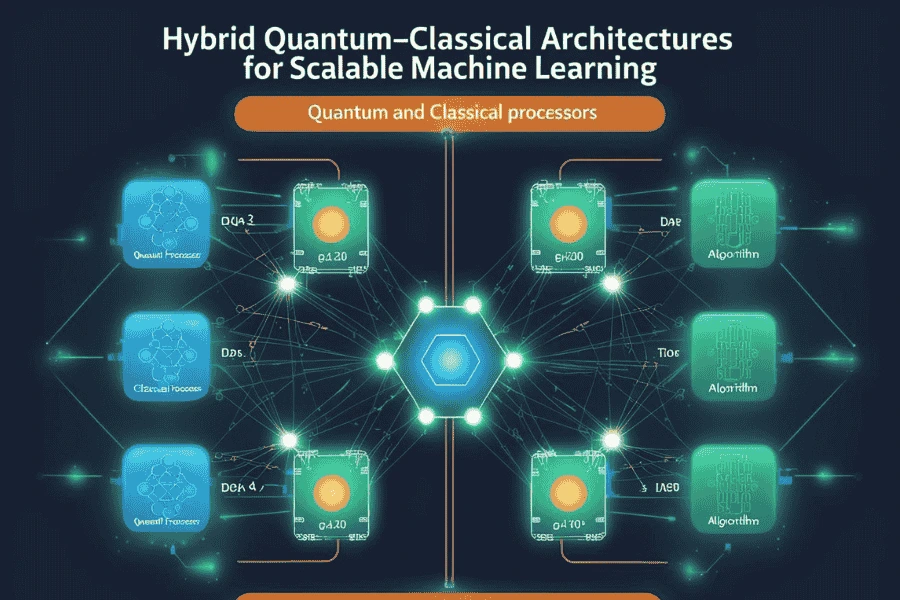Hybrid Quantum-Classical Architectures for Scalable Machine Learning
Introduction
The hybrid quantum-classical architecture is at the forefront of the quantum machine learning revolution, combining classical computing's scalability with the power of quantum computing for enhanced performance. In this article, we explore how these quantum-classical hybrid models can transform machine learning by addressing complex optimization and classification problems that are typically intractable with classical systems alone.

The Quantum-Classical Hybrid Approach:
Quantum Systems: Quantum computers can potentially solve certain types of problems much faster than classical computers, especially problems involving complex optimization and large-scale data sets. Quantum systems excel in tasks like solving linear systems, factoring, or simulating physical systems, which can enhance MLma learning
Optimization Problems: Quantum algorithms, such as those for combinatorial optimization and machine learning, could provide more efficient solutions to problems encountered in data science, such as portfolio optimization, clustering, and feature selection.
Classical Systems: Despite the promise of quantum computing, classical computers are still very efficient at many tasks, including handling large datasets, providing reliable infrastructure, and performing computations that don’t yet benefit from quantum acceleration.
Understanding Hybrid Quantum-Classical Systems
A quantum-classical hybrid machine learning system strategically splits computation tasks. The classical part manages large data structures, loss function evaluations, and model control, while the quantum component focuses on computations that could benefit from quantum parallelism or entanglement.This integration is key to unlocking real-world applications of quantum neural network architecture, allowing systems to capitalize on the unique strengths of both paradigms without being constrained by current quantum hardware limitations.
Use Cases and Applications
Several industries are actively exploring hybrid quantum computing use cases to accelerate machine learning tasks and enhance performance. In materials science, quantum deep learning hybrid models are being utilized to simulate and model atomic interactions with greater accuracy. The financial sector is leveraging hybrid machine learning models with a quantum edge to improve real-time risk assessment and optimize investment portfolios. In cybersecurity, quantum-classical AI systems are contributing to the development of secure communication protocols by employing entanglement-based techniques. These diverse applications highlight how hybrid computing is driving the evolution of practical and efficient AI systems across multiple domains.
Artificial Intelligence and Machine Learning
Quantum machine learning is another area seeing rapid growth. Researchers use low-rank matrix approximation algorithms, inspired by quantum linear algebra, to train deep learning models more efficiently. By understanding the trade-offs in quantum vs classical computing performance, teams can make smarter technology investments. For those starting out, exploring the best quantum computing courses can build a strong foundation.
Future of Hybrid Quantum AI
The future of hybrid quantum AI involves tighter integration between quantum processors and classical nodes, better algorithms for hybrid quantum algorithms in AI, and enhanced tools for debugging quantum-classical workflows.With companies like IBM, Rigetti, and Xanadu investing in quantum frameworks like Qiskit and PennyLane, the momentum is clearly shifting toward quantum-classical hybrid machine learning solutions that are not only experimental but commercially viable.
Conclusion
As quantum hardware continues to evolve, hybrid quantum-classical architectures are expected to enable scalable solutions for real-world problems in drug discovery, financial modeling, and natural language processing (NLP). These architectures promise to drive the future of quantum-enhanced machine learning and AI systems.
Active Events
Best Tips to Create a Job-Ready Data Science Portfolio
Date: Aug 06, 2025 | 7:00 PM(IST)
7:00 PM(IST) - 8:10 PM(IST)
2811 people have registered
3 Must Have Projects On your CV to Get into Data Analysis
Date: Aug 05, 2025 | 7:00 PM(IST)
7:00 PM(IST) - 8:10 PM(IST)
2753 people have registered
Bootcamps
Data Science Bootcamp
- Duration:8 weeks
- Start Date:October 5, 2024
Full Stack Software Development Bootcamp
- Duration:8 weeks
- Start Date:October 5, 2024
